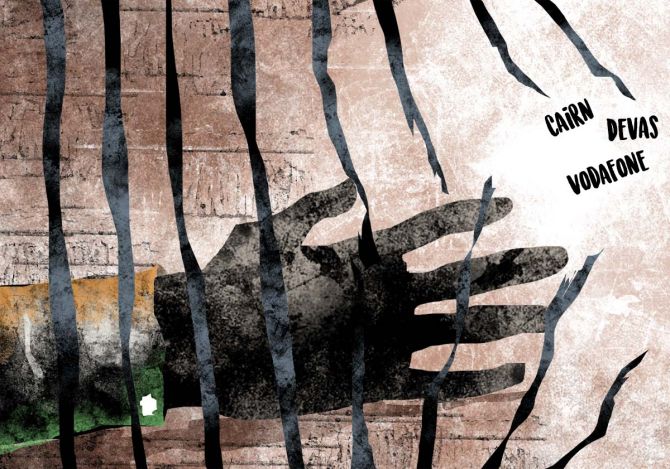The Indian State's arbitrariness may have come to be accepted with resignation within the country, but when it behaves in the same manner with external players, it gets a push-back, notes T N Ninan

The Indian State is used to treating the country's citizens as its captives, to be dealt with as arbitrarily as anyone in authority wishes.
Regardless of which party is in power -- nat the Centre and in the states -- the predatory nature of the State is the same.
Consider just three pieces of evidence. First, more than two-thirds of the people held in India's jails have not been convicted of any crime, they merely face court processes that go on for years if not decades.
Sometimes they die while waiting, as Stan Swamy just did.
Second, the tax authorities reportedly lose 85 per cent of tax cases in the various high courts, and 74 per cent of cases in the Supreme Court.
Is anyone held to account for wasting the courts' time, and the harassment and cost this imposes on taxpayers? You bet not.
And in the third instance, the stock market regulator is able to collect only a little over 1 per cent -- yes, 1 per cent -- of the financial penalties for which it sends out notices.
As Business Standard has reported, of notices worth Rs 81,086 crore (Rs 810.86 billion) sent out since 2013, the Securities and Exchange Board of India has been able to recover all of Rs 887 crore (Rs 8.87 billion).
All three examples point to arbitrariness or, at the very least, counter-productive zeal by different arms of the state, with little thought for the citizen at the receiving end.
For him or her, the process itself is increasingly the eventual punishment.
If you have spent 20 years in jail, or been bankrupted by legal costs, what does it matter if you have 'won' or lost the case?
This may have come to be accepted with resignation within the country as the way in which the system works in our imperfect democracy. But when the State behaves in the same manner with external players, it gets a push-back that it does not usually experience domestically.
Again, there are three immediate examples before us -- Cairn, Vodafone and Devas Multimedia.
In the first two, involving retrospective taxation, India has lost arbitration cases internationally -- and lost in unanimous verdicts.
Appeal processes are on, but Cairn has moved to attach Indian assets in several countries -- like real estate, and possibly money with public sector banks and Air India aircraft.
Devas Multimedia, which has won a case against Antrix Corporation (a subsidiary of the Indian Space Research Organisation) for arbitrary cancellation of a contract, might copy Cairn and cause yet more embarrassment.
Ironically, all three cases originated with the Manmohan Singh government, two of them with the introduction of a clause on retrospective taxation in the 2012 Budget.
Such taxation is not unique to India, it has been invoked in specific situations by other countries with reputed processes.
But what India saw as a sovereign tax issue has been treated as an investment issue and deemed violative of bilateral investment guarantee treaties (prompting the Modi government to scrap 50 such treaties).
The Devas-Antrix deal was terminated by the Manmohan Singh government on various grounds, and a former Isro chairman barred from holding public office.
As Devas subsequently argued in a US court, nine arbitrators and three international tribunals had deemed the termination to be unlawful.
The sums involved in each of these cases run to more than a billion dollars.
The BJP fought the 2014 elections with a stand against 'tax terrorism', and it indirectly rehabilitated the former Isro chairman by admitting him as its member. But, seven years later, its continuing 'terrorism' has left the government with considerable egg on its face.
As with domestic tax cases, the government may well believe it has a case even if it has lost in court. But there is a difference.
Domestically, the State pays no penalty for converting the process into punishment.
Internationally, once the verdict has gone against you, the State has to accept the consequences of its actions.
If these setbacks persuade the State to behave differently, it might want to re-consider its new digital media rules that exceed the scope of the parent legislation and are tailor-made for yet more arbitrariness.
Feature Presentation: Rajesh Alva/Rediff.com











